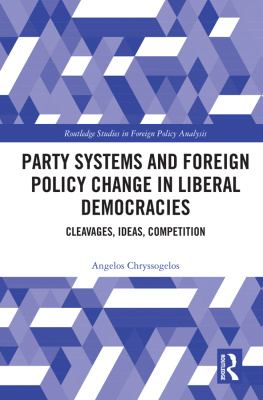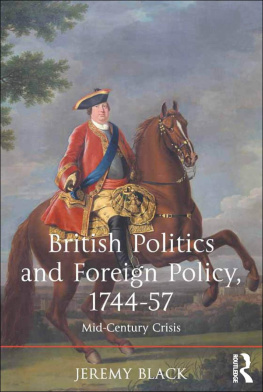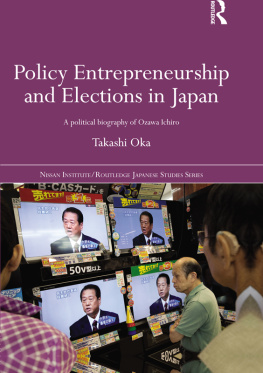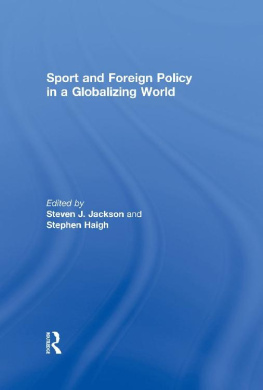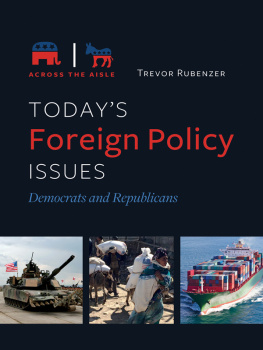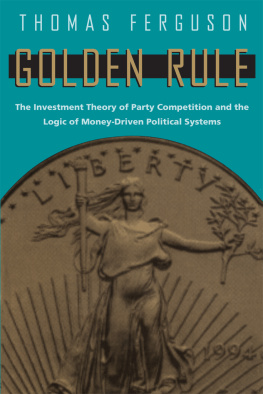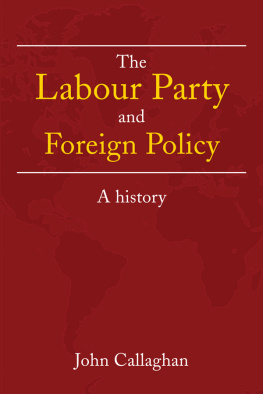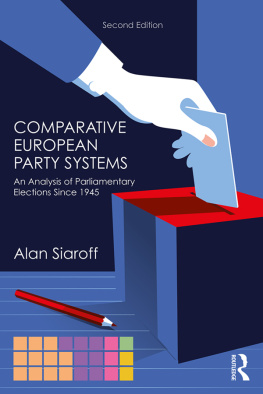This book examines the importance of political parties to foreign policy given the surprising results of elections in liberal democracies in recent years. It advances our knowledge of party politics to account for the content, degree, timing and policy area of foreign policy change through a nuanced account of the nexus of international and domestic pressures on party competition. Our knowledge of party politics and foreign policy change are substantially enriched as a result of this timely and welcome contribution to the literature.
Cameron G. Thies, Professor of Political Science, School of Politics and Global Studies, Arizona State University, USA
Finally, a book dedicated to political parties and foreign policy. Chryssogelos upends the external/internal dichotomy, showing how the dynamics of party competition determine how states respond to structural pressures. The volume pushes the boundaries of the field, bringing society and the state back into the politics of foreign policy change, and weaving together a host of themes in electoral and party politics. Essential reading for anybody interested in the link between politics at home and abroad.
Benjamin Martill, Lecturer in Politics and International Relations, University of Edinburgh, UK
Party Systems and Foreign Policy Change in Liberal Democracies
How do political parties affect foreign policy? This book answers this question by exploring the role of party politics as a source of foreign policy change in liberal democracies.
The book shifts the focus from individual political parties to party systems as the context in which parties ideologies receive precise content and their preferences are formed. The central claim is that foreign policy change arises from within transformed discursive contexts of party competition, when a new language of politics that constitutes anew parties self-understanding of what they stand for and compete over emerges in a party system. By comparing cases of contested foreign policy change, the book shows how such transformations in party competition determine whether and when international pressures on a state will translate into decisions to institute foreign policy change and what degree of change will be ultimately implemented.
With a novel framework which bridges concepts of international relations and comparative politics, the book will be of interest to researchers and students in the areas of international relations theory, foreign policy analysis and comparative politics, and generally to anyone wanting to understand how and when parties, elections and voters contribute to international change.
Angelos Chryssogelos is lecturer (assistant professor) in politics and international relations at the School of Social Sciences, London Metropolitan University and a Jean Monnet Fellow at the Robert Schuman Centre for Advanced Studies of the European University Institute.
Routledge Studies in Foreign Policy Analysis
Series Editors:
Christopher Alden, London School of Economics, UK, and Amnon Aran, City University of London, UK
The Foreign Policy Analysis (FPA) series covers a broad intellectual canvass, which brings together scholars of International Relations, Area Studies, Politics, and other related fields such as Political Psychology and Administrative Studies. It also engages with a wide range of empirical issues: from the study of the foreign policy of individual countries, to specific aspects of foreign policy such as economic diplomacy or bureaucratic politics, through germane theoretical issues such as rationality and foreign policy. The Series aims to specialize in FPA as well as appeal to the wider community of scholars within International Relations, related fields, and amongst practitioners. As such the range of topics covered by the Series includes, but is not limited to, foreign policy decision-making; the foreign policy of individual states and non-state actors. In addition it will include analytical aspects of foreign policy, for instance, the role of domestic factors; political parties; elites. Theoretical issue-areas that advance the study of foreign policy analysis, for example, FPA and Gender, Critical FPA, FPA in a new media landscape, Ethics and FPA, are also welcomed.
Americas Allies and the Decline of US Hegemony
Edited by Jonathan Paquin and Justin Massie
Turkey, The EU, and The Middle East
Foreign Policy Cooperation and The Arab Uprisings
Bura Ssler
Foreign Policy Analysis of a Baltic State
Lithuania and Grybauskait Doctrine
Tomas Janelinas
Party Systems and Foreign Policy Change in Liberal Democracies
Cleavages, Ideas, Competition
Angelos Chryssogelos
For more information about this series, please visit:
www.routledge.com/Routledge-Studies-in-Foreign-Policy-Analysis/book-series/RSFPA
Party Systems and Foreign Policy Change in Liberal Democracies
Cleavages, Ideas, Competition
Angelos Chryssogelos
First published 2021
by Routledge
2 Park Square, Milton Park, Abingdon, Oxon OX14 4RN
and by Routledge
52 Vanderbilt Avenue, New York, NY 10017
Routledge is an imprint of the Taylor & Francis Group, an informa business
2021 Angelos Chryssogelos
The right of Angelos Chryssogelos to be identified as author of this work has been asserted by him in accordance with sections 77 and 78 of the Copyright, Designs and Patents Act 1988.
All rights reserved. No part of this book may be reprinted or reproduced or utilised in any form or by any electronic, mechanical, or other means, now known or hereafter invented, including photocopying and recording, or in any information storage or retrieval system, without permission in writing from the publishers.
Trademark notice: Product or corporate names may be trademarks or registered trademarks, and are used only for identification and explanation without intent to infringe.
British Library Cataloguing-in-Publication Data
A catalogue record for this book is available from the British Library
Library of Congress Cataloging-in-Publication Data
Names: Chryssogelos, Angelos, author.
Title: Party systems and foreign policy change in liberal democracies: cleavages, ideas, competition/Angelos Chryssogelos.
Description: Abingdon, Oxon ; New York, NY : Routledge, 2021. | Series: Foreign policy analysis | Includes bibliographical references and index.
Subjects: LCSH: International relationsPolitical aspects. | Political parties. | Political partiesGermany (West) | Political partiesCanada. | Political partiesGreece. | Germany (West)Foreign relations. | GreeceForeign relations1974 | CanadaForeign relations1945
Classification: LCC JZ1242. C464 2021 (print) | LCC JZ1242 (ebook) | DDC 327dc23
LC record available at https://lccn.loc.gov/2020031135
LC ebook record available at https://lccn.loc.gov/2020031136
ISBN: 978-0-367-44463-1 (hbk)
ISBN: 978-1-003-00991-7 (ebk)
Typeset in Times New Roman
by Apex CoVantage, LLC
Angelos Chryssogelos is lecturer (assistant professor) in politics and international relations at the School of Social Sciences, London Metropolitan University. He studied in Greece and the Netherlands and received his doctorate from the European University Institute in Florence. He has been a National Bank of Greece Postdoctoral Fellow at the Hellenic Observatory of the London School of Economics (201516), a Berggruen-Weatherhead Research Fellow at the Global Populism research cluster of the Weatherhead Center, Harvard University (201819) and a Fulbright-Schuman Scholar at SAIS Johns Hopkins (2019). In the 202021 academic year, he is a Jean Monnet Fellow at the Robert Schuman Centre for Advanced Studies of the EUI. His articles have appeared in, among others, the

